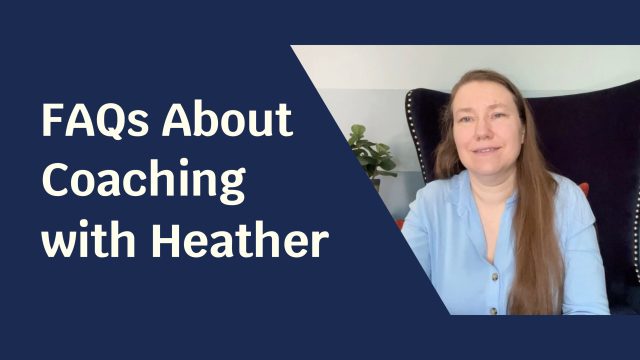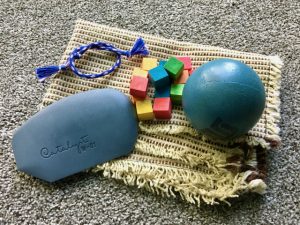
What is coaching?
Coaching is a way to have a conversation with someone who has the skills and the ability to draw out from you what works for you. What’s getting in your way? Why are you not doing the things that you say that you want to do, that you genuinely do want to do but are having resistance to? There’s stress around it, or you are trying to and you just can’t make it happen.
Or why are you struggling with certain things that you’re doing? You don’t want to do them, but you can’t stop yourself. You can’t get away from it.
It can be a way to figure out what it is that you really want in life. How do you make things better for yourself? Not doing it the way that works for someone else, but the way that works for you specifically.
What can we work on in coaching?
So you can come to a coaching session with something in mind that you want to figure out. It might be, “This thing happened recently and I had this really big reaction to it. Intellectually I know that it was out of proportion, but I don’t know why and I want to figure out what happened there.” Or maybe there’s something stressful coming up and you want to work with it in different ways than you have in the past.
Maybe there’s something in your life that you just want to make better communication with. A partner or at work, or how to figure out what’s you and what’s the mask. What kind of accommodations could you request that would actually be useful and how you can have that conversation that you’re dreading, and can’t get yourself to actually have, to actually request for accommodations.
It could be any number of things. Those are common ones, but whatever it is that in your life you’re trying to make better. So we can work through that. If you’re not exactly sure what specifically you want to work on in a particular session, I can help you narrow it down. It’s usually pretty easy to find something juicy.
What can I expect in a coaching session?
So how I do sessions, usually you’ll start by bringing whatever issue it is that you want to work through that day, or we figure it out together, and then I’ll start by inviting you to tell me more about it.
What’s going on? What are the thoughts that come up? Maybe what kind of body reactions or physical sensations you notice when you’re talking about this? What emotions come up? If those things are difficult for you, I can help you figure them out. If they’re triggering, we don’t have to go there. But I’ll try to ask questions, ask powerful questions that will help you get to the things that are happening underneath the surface, not just the things that are happening, but why it’s happening. Why are you acting this way when she says that or why when they say the other thing you have a meltdown? Why is this overwhelming? Why do you shut down in this situation? Whatever it is that’s going on.
Not just the things that are happening, but why it’s happening.
If you go off on tangents, that’s totally fine. I actually find that really useful, even though people apologize for it all the time. You don’t need to. Your mind made a connection to this thing, or that thing, or the other thing, and I see my job as trying to figure out what those connections are, “Why did this make sense to your brain? Why did that make sense? Why did this come up in your mind and put all the different pieces together?” And when I have a hypothesis about what’s going on underneath the surface, I’ll present that to you and invite you to tell me where I’m wrong. I don’t need to be right all the time, and you know your life better than I do.
So we’ll start with that and refine it together until it feels to you like “Yeah, that’s it! That’s what’s really happening here.” And then, depending on what that is, we can work with it in a variety of different ways. I have lots of different strategies and tools, and we might be able to dissolve it, question it, resolve it or free it up in some way. It might involve a more thought-based questioning of the painful thought that’s underneath there. It might be like talking to your younger self, if you’re open to that. There could be a variety of different things that we could do with it.
When it feels like it’s getting resolved, like it’s getting freed up, then so many things change at that point. Often your body will feel open or lighter, physically. Your brain starts working in new ways and new options become available. As we work through this, it frees up a lot of energy and your prefrontal cortex starts turning on all the way again. The right hemisphere of your brain, that’s creative and problem solving in outside of the box ways, starts being able to use all of its resources again.
Often what happens is the way forward will seem a lot more obvious to you. It will very naturally come back to that original situation that you started with, and you’ll know what you want to do about it. At that point, the practical stuff, the strategies and tools can become useful, and we can get into that and make plans for it. Make ideas, strategize, refine it, and those are the plans that actually turn out to work. You’ll actually do those kinds of plans now that the underlying situation isn’t getting in your way anymore.
What’s the difference between coaching and therapy?
So the difference between therapy and coaching, at least the way I do it:
I find it useful to acknowledge that there are reasons why we’re doing the things that we’re doing, why we’re repeating certain patterns over and over even though we know they’re not helpful, or why we’re resisting certain things, even though we know it would be helpful. The areas where we get stuck in our life, things that we can’t figure out what’s going on there. There’s a reason for all of that. I find it useful to figure out where that’s coming from. It might be that this thing happened when you were six, for example, and it’s still affecting you in certain ways that may not be super obvious.
Whereas therapy is going to go into that situation and be like, “Okay, this thing happened when you were six. Let’s get in there, unpack that, and heal the experience itself.” What I’ll do is to acknowledge, “Hey, that thing happened when you were six. Here’s the lesson that you learned from that or here’s the belief that you took away and that belief is still affecting you. Let’s play with that belief, that lesson that you’ve learned from it.” I want to play with that lesson.
Are you going to tell me what to do?
I’m not going to tell you what to do, tell you what I think you should do, or what I would do in your place, because I’m not in your place. You know your life and the situation better than anyone else, and you’re the one who will be living with it. What I can do is to help you figure out for yourself what you actually want and what you need, not what other people tell you you should want, or what should work or what would be a good idea. It doesn’t matter. Any of that doesn’t matter. What matters is what actually matters to you, and I can help you with that. I can help you figure out how to make decisions, how to listen to yourself and trust yourself. When you do, you will make the best decision.
How often do we meet?
Most people find that working with me on a regular basis is really helpful, especially at the beginning to gain some momentum. About every two to three weeks works well for most people. Some people want to work weekly, but to be honest, that can get kind of intense. Some people want to just do it once a month or once in a while when they have something particular to work through. And that’s totally fine. That works especially well after we’ve been working for a while, and you’re getting familiar with the process, and have been incorporating that into your life more often, and just need some help working through the especially sticky stuff.
Is it okay if I stim?
When we’re working together on Zoom, you are very welcome to stim, fidget, tic, doodle, take notes, eat or drink, and look away from the camera. I don’t mind any of that. Do what you need to do to feel good in your body and in your mind. You’ll notice that I often have a fidget toy or a stim with me, and I always have a weighted blanket on my lap. That helps my body relax. And if the zoom thing doesn’t work for you, we can do it just over the phone. That works fine too.
Are you interested in working with me?
Is the work that I do what you’re looking for (whether you’ve previously been able to articulate it or not)?
First, read about my approach to later discovery autism coaching, and more about my story.
Here’s what sessions with me are like. Is my coaching style a fit for you?
And here’s two more posts answering common questions about coaching with me, including what to expect, what I’m good at, and what I won’t be the right coach for (that’s just as important): Coaching with Heather: more FAQs and Coaching with Heather: FAQs on goals and structure.




